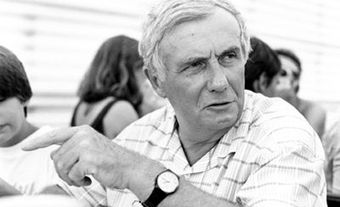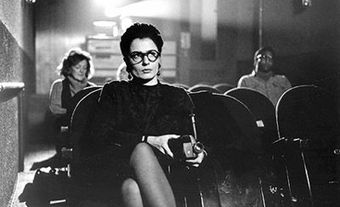
Tom Daly
Thomas Cullen Daly, "Tom," filmmaker, editor, producer (b at Toronto 25 Apr 1918, d at Montréal 18 Sept 2011). Tom Daly studied classics and English literature at the University of Toronto and joined the NATIONAL FILM BOARD (NFB) just after its inception in 1940. He spent a distinguished career there until retiring in 1984 with more than 300 titles to his credit. Both his role in the development of the NFB and his influence on documentary film have been substantial if not widely known. He helped sustain an atmosphere of creative energy at the Film Board, and he supported numerous filmmakers in their experiments with documentary style.During the Second World War, he worked closely with Stuart Legg as his assistant on the World in Action series. He was Legg's editing assistant on Churchill's Island (1941), the NFB's first Oscar-winning short film which set the tone for the wartime NFB documentaries. He edited several World in Action and Canada Carries On films himself, and established the Board's extensive stock-shot library. Over the 40 years Daly worked for the NFB, he was regarded as its best picture editor
After the war, Tom Daly became a producer. He presided over the development of his production unit, Unit B, into a world-famous source of innovative films that have become documentary classics. He both produced and edited Corral (1954), CITY OF GOLD (1957; Film of the Year, Canadian Film Awards), UNIVERSE (1960; Film of the Year, Canadian Film Awards and Jury Prize at Cannes) and Circle of the Sun (1961); he produced Paul Tomkowicz: Street-railway Switchman (1954), Very Nice, Very Nice (1961), and Lonely Boy (1962; Film of the Year, Canadian Film Awards), the first rock documentary. Some of the NFB's most talented filmmakers worked with him on these films: Terence MACARTNEY-FILGATE, Colin LOW, Roman KROITOR, Wolf KOENIG, John Spotton, and Stanley Jackson. He also encouraged the development of the NFB's francophone filmmakers in the late 1950s and early 1960s. Eight Unit B films received Academy Award nominations, and Daly was the executive producer on Candid Eye, the celebrated 14-film direct-cinema series, made for the CBC between 1958-61.
After the break-up of the unit system in 1964, Daly edited the major portion of a multiscreen film presentation for LABYRINTHE, which was designed by Kroitor and produced by the NFB for EXPO'67. The short film, In the Labyrinth (1979), preserved for film audiences part of the Labyrinth experience. In the late 1960s and 1970s, he mentored a new generation of important filmmakers, among them Mort Ransen (Christopher's Movie Matinee 1968), Michael RUBBO (Sad Song of Yellow Skin 1970 and Waiting for Fidel 1974), Martin Duckworth (The Wish 1970), Albert Kish (This Is a Photograph 1971), Derek May (Sananguagat: Inuit Masterworks 1974 and Tony Ianzuelo (North China Commune 1979).
Tom Daly remained active and creative up to his retirement; among his important last films were The Last Days of Living (1980); Donald Winkler's F.R. Scott: Rhyme and Reason (1982); and Colin Low's Standing Alone (1982).

 Share on Facebook
Share on Facebook Share on X
Share on X Share by Email
Share by Email Share on Google Classroom
Share on Google Classroom


